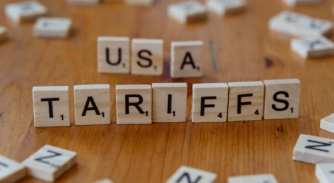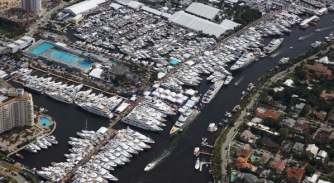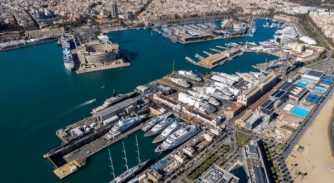When elephants fight
The “most beautiful word” has dominated international headlines for weeks. But will yachting be flattened under the weight of global trade wars?

For a word that’s supposedly the most “beautiful in the dictionary”, I think we’re all pretty sick of it by now. Recent global headlines have been dominated by ‘tariffs’, economic posturing, a parade of presidential ass-kissing and a tense stand-off involving some very angry penguins. Amid the melée, global alliances and positions are shifting at a cosmic pace, with uncertainty now the only certainty.
Trump’s “Liberation Day” tariffs imposed a 10 per cent blanket tariff on all imported goods entering the US, with an additional 20 per cent on items from targeted regions, including the EU. Since they were announced on 2 April, global markets entered one of their weakest points this year before bouncing back just before the 90-day pause was announced.
Two weeks later, no formal mechanism for exemption filings has been outlined at the time of writing. It’s a messy, performative trade play wrapped in patriotic branding, and the markets have responded to the volatility in kind.
In our sector, some see this shake-up in the global economic order as an overdue, necessary correction. Others are more cautious. Ultimately, the potential impact of the tariffs is a guessing game. Speaking with SuperyachtNews, Robb Maass, partner at US law firm Alley, Maass, Rogers & Lindsay, explains that the turmoil in the broader political landscape will likely have a more noticeable and lasting mark on our operations.
“There is a Swahili proverb that goes, ‘When elephants fight, the grass gets trampled’; right now, the yachting industry is the grass, with the risk all at the governmental level. On both sides of the Atlantic, we’ll find ways to manage, but it’s clear there’s danger being created by this posturing.
“I don’t know that the tariffs will last four years. But with Trump, he’s not going anywhere. He likes disruption. Some people call it a negotiating tactic, but I think he enjoys being in the spotlight. And my concern is that even if these tariffs roll off, there will be another round of policy shocks not far behind.”
What the tariffs (could) actually mean for our market is yet to be fully understood. The 90-day pause may grant some well-received alleviation in immediate pressures, giving the industry time to adjust and prepare, but leaders are already identifying some anticipated potential headwinds and shifts in behaviour.
For example, the enforced changes to American international economic policy are likely to push more yachts into regions already struggling with cruising and mooring capacity. James Jaffa, managing partner of the law firm Jaffa & Co, which has offices in the UK and the US, highlights that tariffs will most probably apply not when a boat physically arrives in the US but rather when it’s formally imported. This could make American owners rethink where they cruise and dock their vessel.

James Jaffa
“So, one option is for US owners to stay in the Caribbean and simply not come to the US. Alternatively, more US owners will likely structure and flag their yachts outside the US, and utilise cruising permits, which avoids the need to import the vessel.”
“The key point with the tariffs is that they will almost certainly apply when the vessel is imported – and I stress seem because we still don’t have full visibility. The fear initially was that tariffs would be applied as soon as the yacht physically arrived in the US, but mercifully that is unlikely. It is the formal importation that will trigger the tariff liability,” he explains.
“So, one option is for US owners to stay in the Caribbean and simply not come to the US. Alternatively, more US owners will likely structure and flag their yachts outside the US, and utilise cruising permits, which avoids the need to import the vessel. This works a bit like temporary admission in Europe, with the cruising permit valid for a specific period of time.”
At a grassroots level, however, business is booming for some dealmakers. It’s causing some surprise because during any period of uncertainty, whether it’s turmoil in the markets or geopolitical tension, buyers usually pull back. But at least at the upper end of the market, specifically in the larger yacht segments, this is yet to be seen.
That’s not necessarily the case as you move down-market into smaller boats, though, especially between the 18- to 30-metre segments. Maass explains that, from his perspective, people there are seemingly more reluctant to move forward.
“As for tariffs, they’re only payable when boats are formally imported into the US. But with very large yachts, we don’t need to import them. They can cruise in US waters without being formally imported. So for that part of the market, it’s more of a notional concern than a real one.”
Therefore, distributors in the US, particularly those dealing in these mid-sized serial yachts, are the ones most exposed. This is one of the sharpest pinch points in this saga that has been identified thus far. Many operate on fixed-price contracts, and with tariffs now effectively adding up to 34 per cent on certain imports, margins will evaporate.
“I had one gentleman call me who is buying a European built yacht through a distributor based in the US,” says Jaffa. “In that case, the builder had sold the boat to the distributor, who was then selling it to the American buyer. The buyer had (fortunately for him) signed a contract which required delivery of the vessel with all duties and taxes included. This was reassuring for the end buyer, but perhaps not so for the distributor, in the middle, who could feasibly be on the hook for the tariff imposed by the current administration.”
These businesses could find themselves in a position where they can’t honour the quoted price or have to absorb a sizeable margin loss to deliver the boat as agreed. Most of these dealers pre-buy inventory, meaning they’ve committed to an agreed number of yachts for the year at fixed prices. If they’ve already pre-sold those boats at agreed margins and are facing a sudden 34 per cent increase in landed costs, they’re caught in the middle.

Robb Maass
“What determines whether someone wants to buy a yacht has less to do with their financial situation and more to do with psychology. If they don’t feel good about the world, buying a luxury item isn’t top of mind.”
Further along the line, there will be no difference for the buyer. They won’t be the one walking into a distributor and paying the tariff directly. The broker imports the vessel, absorbs the tariff and passes that cost straight through. Just like with duty today, the current 1.5 per cent import duty on yachts is always added to the sale price by the importer and tariffs will be treated the same: dollar for dollar, built into the final cost.
“I don’t think the tariffs will have a huge impact on owners of larger superyacht owners,” adds Jaffa. “They have the ability and the advisers to structure ownership or entry into the US in ways that mitigate exposure. It’s more about how unsettled the environment feels.”
And it’s this uncertainty that’s affecting buyer sentiment and creating hesitation. When the stock market’s booming, even ultra-high-net-worth individuals feel flush and are likelier to pull the trigger on a yacht. But when markets are down, even if you’re still wealthy, emotionally, you’re less inclined to make that leap. Regarding the proposed tariffs, when you do something this sweeping all at once, it’s incredibly disruptive.
“What determines whether someone wants to buy a yacht has less to do with their financial situation and more to do with psychology. If they don’t feel good about the world, buying a luxury item isn’t top of mind,” explains Maass. “That’s what we’re seeing now – or at least what I fear might be creeping in. Although to be fair, it hasn’t hit the market in a material way yet.”
Jaffa agrees. “We’ve just been through five or six years of back-to-back economic and geopolitical shocks – Brexit, COVID, Russia and now tariffs. But I’m actually quite optimistic. I think our client base has adapted to uncertainty. If someone wants a yacht, they still want a yacht. That hasn’t changed; they’ve become more accustomed to planning around disruption.”
The broader fear isn’t even the immediate economic hit. The market always recovers, so that’s not the issue. The problem is the feeling that the US is damaging relationships with its allies, which will have a much longer-lasting effect on our businesses and how we operate. And for those with boots on the ground and a clear view of the geo-political landscape in a yachting context, the general response is to keep steady, stay agile and prepare for disruption.
Legendary American broadcaster Walter Cronkite famously signed off his reports with “And that’s the way it is”. A more fitting sign-off for this moment might be: “And that’s the way it seems”. That sentiment may be as close to certainty as we get.
“You can’t prepare yourself for the unknown,” adds Maass. “All I can say is, don’t get complacent, because his will be a disruptive period. The yacht market won’t vanish, demand won’t disappear, but we will have to manage through disruptions like these.
“And we’ve done it before. Look at the dot-com bust, 9/11, the 2008 crash – those were all supposed to be market-ending events. I remember thinking I’d be out on the corner handing out résumés and selling pencils. But we got through it. Every time, we came back faster than expected. This will be no different.”
Profile links
NEW: Sign up for SuperyachtNewsweek!
Get the latest weekly news, in-depth reports, intelligence, and strategic insights, delivered directly from The Superyacht Group's editors and market analysts.
Stay at the forefront of the superyacht industry with SuperyachtNewsweek
Click here to become part of The Superyacht Group community, and join us in our mission to make this industry accessible to all, and prosperous for the long-term. We are offering access to the superyacht industry’s most comprehensive and longstanding archive of business-critical information, as well as a comprehensive, real-time superyacht fleet database, for just £10 per month, because we are One Industry with One Mission. Sign up here.
Related news

“Not too late to change tack!”
European Boating Industry statement on EU tariffs on US recreational boats
Business

Seaborn in the USA
With a presidential election imminent, we dissect the American superyacht market to determine the health of the market across the Atlantic
Business

MB92 secures America's Cup partnership
The superyacht refit and repair facility will offer services to yachts attending the 37th edition of the America's Cup in Barcelona this year
Crew
Related news
“Not too late to change tack!”
1 week ago
Seaborn in the USA
6 months ago
MB92 secures America's Cup partnership
9 months ago
NEW: Sign up for
SuperyachtNewsweek!
Get the latest weekly news, in-depth reports, intelligence, and strategic insights, delivered directly from The Superyacht Group's editors and market analysts.
Stay at the forefront of the superyacht industry with SuperyachtNewsweek



